Star Date: Jan 2018
Bali
Hello Dear Family & Friends!
“Om Swasti Astu.” “Suksma”
(Hello, Thank you- Balinese)

“From the stars… and to the stars
we shall return.”
At daybreak flocks of large, stately white herons fly across the sky in search of food. This morning, during my meditation, I saw one lone white heron flying twice as high as the others, sunlight shining on it like a plane way up high, going in the opposite direction. I said without knowing, “Bye Gami. Happy flying!” And then the news came. Our dear Gami has gone flying! Safe journey. We know this will be your best trip ever!
Knowing a bit of the culture in Bali, observing throughout over 25 years of visits, I was able to say we will have cremation, then ceremony when we return home. He understood. Sad at the loss of a wonderful spirit on this earth we were glad to know she is joyfully flying beyond. In researching the culture and beliefs of the Balinese we found many similarities in their views of death.
During celebrations Balinese wear headdresses and uniquely folded head scarves, along with colorful saris and accenting sashes.. During processions women carry trays of fruit and flowers on their head. Large ceremonies are presided over by Brahmin priests. Lower caste priests care for temples and perform local ceremonies.
If there is a problem the Balinese consult a pedanda, a high caste Brahmin priest. If there is a problem with a shrine, for example, the pedanda goes into a trance and transfers the ancestral spirits of a shrine to temporary bamboo shrines until new permanent shrines are built and the spirits can be transferred there on an astrologically auspicious day.
The pedanda often has long hair tied in a knot at the top of his head. After one ceremony that appeared not to work one pedanda stated, “The spirits continually remind us we are fighting an eternal battle between good and evil.”
Mystics, healers and artists are just as essential to a typical Balinese community as farmers and merchants. Those who have money share it with those that don’t and land is owned by the gods who are benevolent enough to lend it to human beings for temporary use. The Balinese spend about half their day taking care of chores for food and shelter, and the other half is devoted to festivals, processions, art making, dance and drama. Time is gauged from the rhythms of nature and the stars rather than watches and clocks.
Shamans consult astrological charts, the Balinese calendar, amulets and brochures in Bahasa Indonesian with titles like “How to Stop the Rain.” Young girl dancers are used to welcome the gods to the temples.
Bali Life Ceremonies are an addition to festivals that are held based on the Hindu Saka calendar and the complicated Pawukon Calendar. While national holidays, Nyepi day and temple ceremonies are of great importance , each individual life on Bali must undergo several important ceremonies in order to enter, live and leave this world. The first ceremony is held even before the child is born while the last takes place when the ashes of the deceased are scattered into the sea.
All these ceremonies are aimed at one purpose: protection by gods and protection from evil. The first ceremony of a Balinese takes place before he or she is even born. On the 6th month of the pregnancy a ceremony with offerings is conducted (pegedong-pegedong) to ensure the well being and health of the baby. Once the baby is born the afterbirth is to be placed in a coconut which is wrapped in a white cloth and finally buried near the entrance of the parent’s household.
All these ceremonies are aimed at one purpose: protection by gods and protection from evil. The first ceremony of a Balinese takes place before he or she is even born. On the 6th month of the pregnancy a ceremony with offerings is conducted (pegedong-pegedong) to ensure the well being and health of the baby. Once the baby is born the afterbirth is to be placed in a coconut which is wrapped in a white cloth and finally buried near the entrance of the parent’s household.
The next ceremony in life takes place as soon as the child looses his/her milk teeth (Maketus). During this ceremony the responsibilities of Sanghyang Pance Kumara, the God who has protected the child since birth are withdrawn. From then on the responsibilities rest on the families’ ancestors.
The festivals and life-cycle ceremonies stop for a while, until a Balinese boy or girl reaches the age of adolescence.
In this period of life the important and painful tooth-filing ceremony (Mapandes) takes place, preferable before marriage. By filing away the sharp points of the canine teeth the Balinese believe that human behavior such as lust, greed, anger, drunkenness, jealousy etc. is removed from that specific person.The Balinese consider these final ceremonies as one of the most joyous in their life. When the deceased is cremated his/her soul is released and is able to continue the journey to heaven followed by reincarnation. So instead of sadness, the entire ceremony is a somewhat happy and loud spectacle in which the body of the deceased is carried in a colorful tower to the temple of death.
To make sure that the soul of the deceased will not find its way back home, the tower is turned many times in order to create confusion. I’m always surprised that the tower is still upright after being turned many times by dozens of carriers. The priest, who is standing near the top of the tower next to the body is remarkably always standing on both feet as well.
In keeping with many traditions, bits of my Mom’s ashes were scattered in the ocean of Hawaii with family, in the forest on the mountainside of Mauna Loa, in the calm waters of beautiful Lake Toba, Sumatra, along the shores of Amed in Bali, and finally placed in a plot next to my Dad in Wisconsin. Like me, my Mom valued family and home but loved to explore the world. She would have loved the idea of being placed at home yet in some of the most beautiful and exotic places on earth, places where we can swim with her and honor a life well lived.
We Are All Made of Stars
“Do not miss me, because I will always be with you. In every drop of rain that touches your tongue, in every breath of air you inhale. In the tips of the leaves that you brush with your fingertips as you pass by. I will be there, in every moment. I am not gone, I am only altered, from this state of matter to another. For a moment, for too brief a moment, I was the man that loved you, but now that I am changed, I am the air, the moon, the stars. For we are all made of stars, my beloved.
So do not miss me, because I do not die; I transform – into the wind in the tops of the trees, the wave on the ocean, the pebbles under your foot, the dust on your bookshelves, the midnight sky.
Wherever you look, I will be there.”
( Rowan Coleman, We Are All Made of Stars )
And so it goes…………………………………..Next Bali, a deeper look into this fascinating culture. Until then let’s remember to keep our eyes focused up to the stars in the heavens and our hearts towards the heavenly peace inside each of us. Take care and Thanks for writing, we enjoy hearing from you.
[Source: “Man on Earth” by John Reader, Perennial Libraries, Harper and Row]
[Source: “Ring of Fire” by Lawrence and Lorne Blair, Bantam Books, New York]
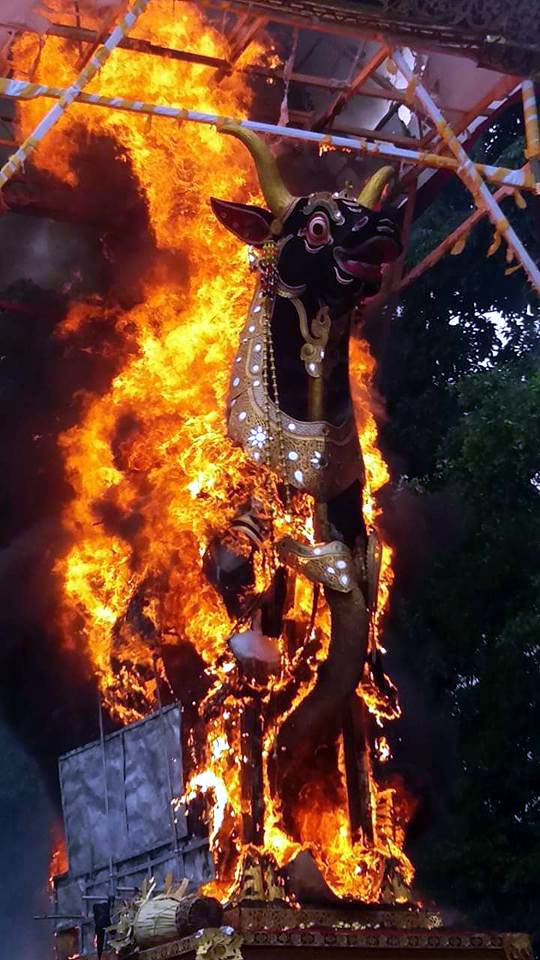
Balinese cremation.
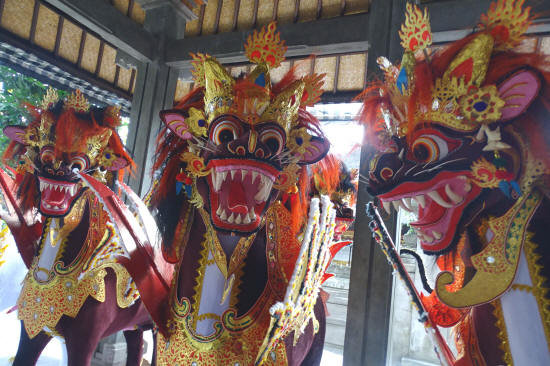
Elaborate sarcophagus.
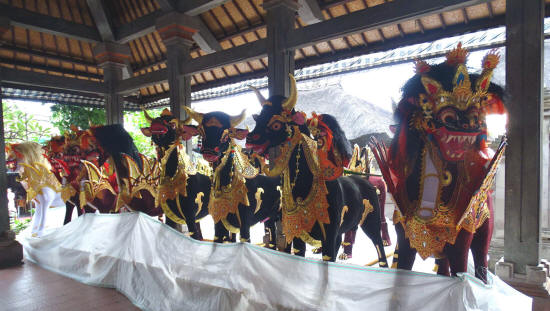
The most common shape is a bull.
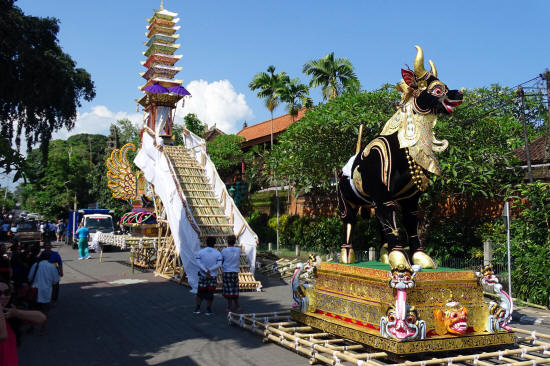
This cremation ceremony was held for a member of the Royal family.
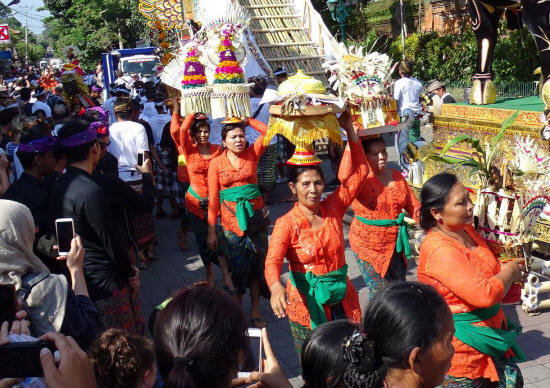
Offerings to the gods.
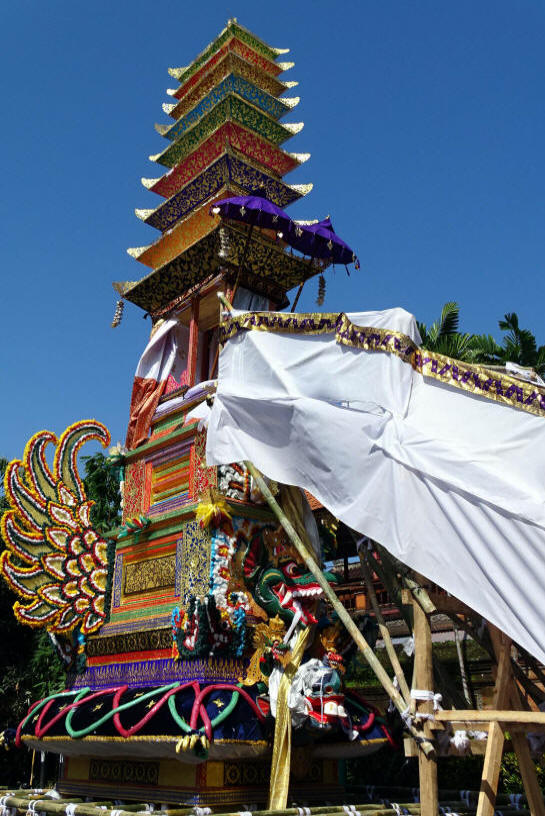
Tower to the stars.
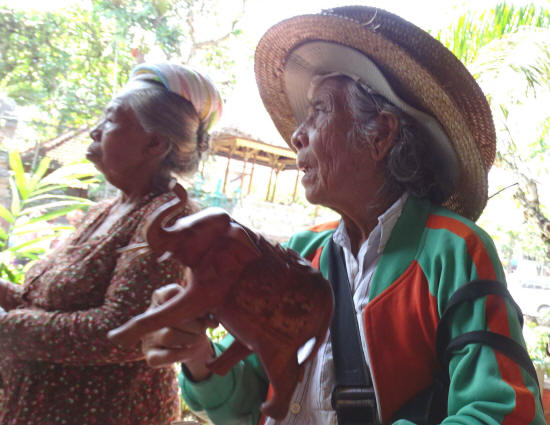
Whenever there is a crowd there are hawkers. These ladies selling hand carved items.
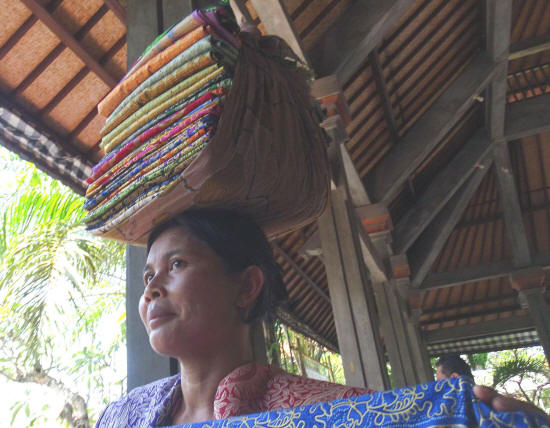
And always ladies selling sarongs so that
people may wrap one around their waist
and enter the temple.
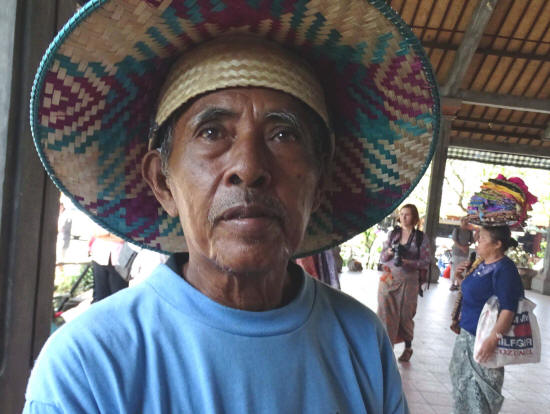
People from the outlying villages are dazzled by the elaborate display put on by royalty.

The priest riding the enormous bull and leading the procession.

Hundreds of men carry the body in the towers built to reach into the heavens.
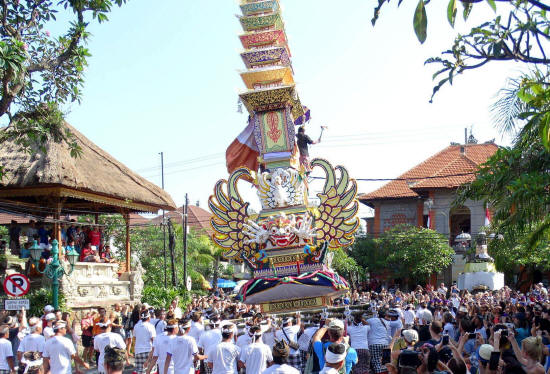
As you can see the bulky float often looks like it is off balance and may tumble over. Somehow it always makes it to the cremation temple.

Family temples come in all shapes and sizes.

This is a simple temple in a family compound.
Love, Light & Laughter,
xoxoox Nancy & Joseph
Travel notes:
1 US Dollar = 14,375.50 Indonesian Rupiah IDR
Amed:
Tambun Sari Beach Homestay
Putu
87 762 832 391
297,000idr low season
Three Brothers 0363 23471
300 #3
Lucky Paradise Bungalows
right side of road 400idr
On the way out of town along a flat quiet beach is the Green Lemon. Not a hyped up tourist place, just a simple warung but right on the beach.
Ubud:
For a true Bali experience our friends Dan & Sri rent out their magnificent villa. They have also have built a beautiful apartment next to their home, in the countryside 10 miles from Ubud. If you want to splurge a little, at the same time getting excellent value for your money, give Dan a call or email him for details.
phone: 62 0361 8627186
link: tirtaasriubud@blogspot.com
email: drogersbali@hotmail.com
He prefers long term stays but will pick you up in Ubud for a stay of 3 nights or longer. It is easy/not expensive to call a car to drive you where you need to go.
For a true Bali experience our friends Dan & Sri rent out their magnificent villa. They have also have built a beautiful apartment next to their home, in the countryside 10 miles from Ubud. If you want to splurge a little, at the same time getting excellent value for your money, give Dan a call or email him for details. phone: 62 0361 8627186 link: tirtaasriubud@blogspot.com email: drogersbali@hotmail.com He prefers long term stays but will pick you up in Ubud for a stay of 3 nights or longer. It is easy/not expensive to call a car to drive you where you need to go.
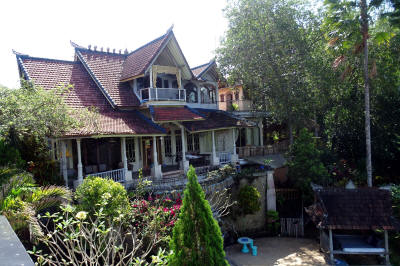
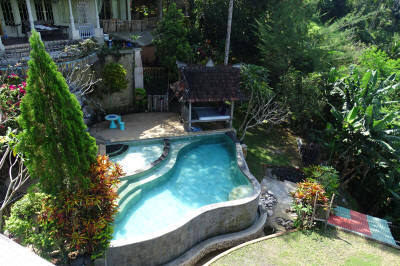
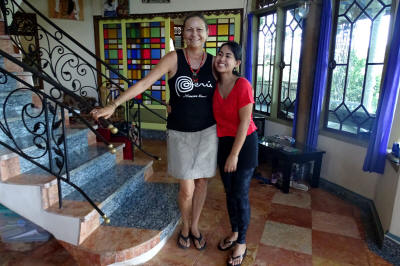
Abu and Made’s Homestay:
Take a walk down Sunset Lane, past Gauri’s Restaurant, right at end of path past Three Dewis. Then just past Ibu Dayus on the right, first gate below, Abu and Made’s Homestay. Great people, new units, good prices, great pool. Currently construction but within a few months this place will be perfect!
Angadda Homestay:
Bamboo forest, rushing river, in the middle of Ubud! Take the alley next to Tino’s Market (red sign) across from the Lotus Cafe on the busy Main Rd. Once you step through the stone gate (right side) of the family compound you have discovered a whole new world. Experience Balinese family life first hand while friendly Grandma Wayan and young Dad Kodek, Ani and Chica help you with any of your needs. Stepping on to the balcony of your room transports you to another world – cool bamboo and rushing water drown out the busyness of the central area of Ubud. (Doubles 150,000r/night – less for one week or more /or for no breakfast. Hot water, simple, basic but clean rooms. Free Wi-Fi.
Email: anggada.h@gmail.com Phone: (0361) 970854
Contact Nyoman for help finding a rental, or driver or getting fresh coconuts daily, a tour local or island wide, or just about anything. He will take you on his motorbike for the going rate or go get something for you. A great guy, helpful, wonderful smile, and honest. Call or email him for anything you need. Tell him Nancy & Joseph recommended him.
phone # 081 999 021 295
Organic produce:
Satvika Bhoga:
An excellent health food store in Sanur (they also deliver to Ubud 2 times a week). Contact Hira or Deepok by email for details: email: satvikabhoga@gmail.com
Fair honest and high quality control for organic produce, all with a smile.
SATVIKA BHOGA ORGANIC & HEALTHY PRODUCTS SHOP open daily 8am – 8pm
Jl. Hang Tuah no 9 Sanur, Denpasar
tel. 0361 783 6741 dan 284 055
Sari Organik:
Complete selection of organic fruit and vegetables. Shop down from Alchemy Restaurant in Penestanan. Best to stop by or order by phone #0361 780 1839
Just past the Yoga Barn turn off is Pizza Bagus (JL Raya Penggosekan) a tasty restaurant serving organic meals and juices. Next door is a small health food store with unique items. They are home to the excellent organic market – direct from the farmers. Saturday 8-2 and across the street, under the tree on Wed 8-1pm. Support this up and coming organic movement.
Ubud Bodyworks, 25 Hanoman St. Ask for Astri for massage. Relaxing to have a strong massage, then a sandalwood scrub, hot flower petal bath (175,000r). Followed by a cup of ginger tea, papaya and tamarind chutney in the quiet courtyard. phone ahead: 62 361 975 720
Immigration:
Visa – Komang Suwini – Bali Budha (2-5 Mon-Fri.) Just stop by komangsuwini@yahoo.com 6281338644857 and +6285238100169
Good prices, reliable, must allow 10 full days to extend or renew a visa. Best for longer stays to get a 2 month visa before arrival – then you may extend 4 months before leaving. Or get a 6 month or yearly social visa. Best deal is a one year retirement (7.5 million p.p.) visa if appropriate.
Komang works out of Bali Buda every afternoon. The little extra they charge is worth not having to go to Denpasar 1-4 times. Only once per year.
Neighbors Tour company Pt. Gedong Sari Tour & Travel. Although we haven’t used this company it is owned by our neighbor, Wayan and he says he has good tours phone# 973370
Healers:
Chakoda Rai – over 90, sees people once in a while. When seeking a healer please ask around. A few are great, a lot aren’t authentic.
Indonesian Jamu is a unique system of traditional herbal medicine that can be consumed on a daily basis for both disease prevention and treatment of serious illness.
Jamu: bladder infection: kumis kucing leaf or beetle nut leaf tea. Turmeric jamu – great for the immune system and even Bali Belly.
Hospital/ Dentists: Kasih Ibu Hospital, has a good international clinic. In Kuta (200,000 to 300,000 for a half day return trip by taxi) Alarm center: 361 223 036. Take the Bus Parwista down then a taxi or to get home you can take the bus from Jimbaran then get off at the Batubulan terminal. Local bemos 30,000 per person shared. By a couple extra seats and go sooner.
Bali Royal Hospital in Denpasar. Dr Wein – good orthopedic surgeon.
Ubud Health Care Jl Sukma 37 Dr Krisna # 0821 8888 2273
A reliable, trustworthy clinic of a doctors in Ubud. If you call they will pick you up.
Tirta Usada Homeopathic Clinic – At the Ibah Hotel right before the bridge. Tjok Gede – Prince of Ubud, great, talented homeopath. homeopathybali@yahoo.com
Dr Diana Sayan Aesthetic Institute In the Mansion Resort +62 361 972 648 Great, careful dentist. Prices a little higher but she does excellent work.
Restaurants:
My favorite Seeds of Life: Gautama St.
Raw, healthy, vegan food and deserts. The best juice in town. Such friendly helpful staff and the owner, Ben, interesting to talk to. Try a juice, a raw pizza slice with salad or lasagna and top it off with a chocolate torte or raspberry cheesecake. Guilt free. Say Hi to Adi, Ketut, Sari, Wayan and the gang from us!
Just down the street: Warung Siam for good Thai food
Further down JL Gautama, Soma’s, Johnny and staff share coconuts, juice, salads or entrees with you in a relaxing courtyard away from the traffic.
Poopies Juice Bar on Jl Bisma. I think they meant to put Poppies on the sign.
Fried crap. We saw this on a menu – I hope they meant fried crab.
On the circuit for worldwide yoga enthusiasts. Classes $10 but they have free community classes 5:30-6:30 nightly. They have peaceful grounds, treatments and a restaurant (with the BEST organic buffet every Sunday 12-2 70,000r) First go to the free form dancing from 11-12:30. Lively, pulsing, with a quiet spiritual wind down. Clear the cobwebs then refuel on the buffet as you visit with new friends from around the globe! A great Sunday tradition.
Another Absolute Must:
Sari Organik:
Turn right up the hill about 200 meters past Cafe Lotus on the Main Road JL Raya in Ubud. Watch for small signs. At turn follow the small middle path which leads out into the rice fields. The 800 meter walk through the lush green fields is spectacular. Arriving at the open air restaurant you have your choice of fresh organic entrees and juices from their own farm. A couple good restaurants have popped up along the path also.
Dayu’s:
Sugriwa Street – one over from JL Hanuman, great organic food. Large portions, unique recipes.
Bali Buda: Restaurant and health food store. Great food and juices – most comprehensive store in town. Bali Buddha down the Main Road, turn right, across from the Post Office. Great organic menu and small bakery and health food store. Another wonderful place to chill and hang out with like minded people. They deliver.
Down to Earth: A bit more pricey in the cafe and store but a good selection and may have what the other stores do not.
Alchemy Restaurant- Penestanan – up the hill from the Bridge, #0361971981 Best organic salad bar in town. Only 60,000r
Dewa’s Warung – JL Gautama
Unfortunately the foreigners this visit have begun doing at Dewas what they wouldn’t dream of doing back home – smoking like chimneys right at the large shared tables, right while their table mates are eating. We gave up and found other smoke free environments. Too bad – great place.
The best local food in town – friendly family run business. Fresh tasty food – over 20 vegetarian items. Say hi to Mama from us!! Try the fern with fresh coconut, rice and tempe with fresh tomato sauce – or any of the curries. You can eat the salad here. They have widened their place since 3 years ago. It’s fun to sit at one of 2 large tables with travelers from all over. One night we Hawaiians were sharing a meal with 2 girls from Sri Lanka, a couple from Germany, a woman from Australia, 2 girls from Hong Kong, a South African and a man from the Czech Republic. What more needs saying?
The Elephant Restaurant – great food, spectacular grounds, just past the bridge on the right side, going out of town .
Gauri’s Restaurant:
# 085 6319 3648 (Kadek also rents vans at a fair price)
Down the path on Sunset Lane off of Jl Bisma. Kadek, Dewi and Gauri are the young family who offer tasty food at a good price. Even when I was cooking we would stop by there for coconuts on our nightly walk through the rice fields.
We attended Kadek and Dewi’s wedding, met new baby Gauri, and then the blessing (Ula ping) of their newly renovated Restaurant. It’s fun to return to a place and make connections.
Places to check out:
Don’t miss Champuan Ridge!!!. Get a taxi to the top of the hiking road then path.(50,000tp from town) Total hiking time down about half an hour but take your time, enjoy the view, stop for a coconut, have a relaxing lunch, check out the temple at the bottom.
Monkey Forest Sanctuary: a must see. Those monkeys are real characters. 30,000 r p.p.
Bali Safari Park (Gianyar):
Long ago on a remote hillside, between the mountain and the sea, in Bali
lived a small village of people who loved Nature. They considered all the wild animals and plants to be their friends. With few people the tigers and other animals lived side by side in peace with the villagers. The 40 hectare park tries to relive this legend. About $40 p.p. so pricey but it was amazingly impressive considering how far from Africa it is!
When the taxi drivers or dance performance touts ask you to buy while walking down the street, just say: “Suda” – already They seem satisfied without further discussion.
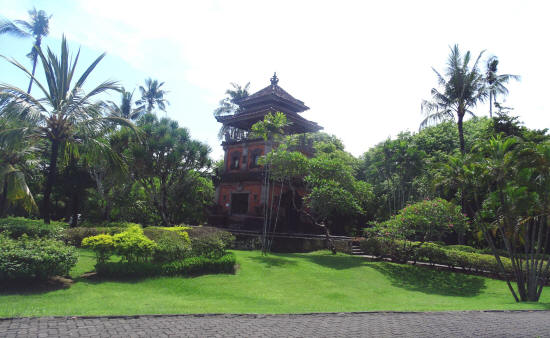
When driving through Bali most non- commercial areas are artistically designed.
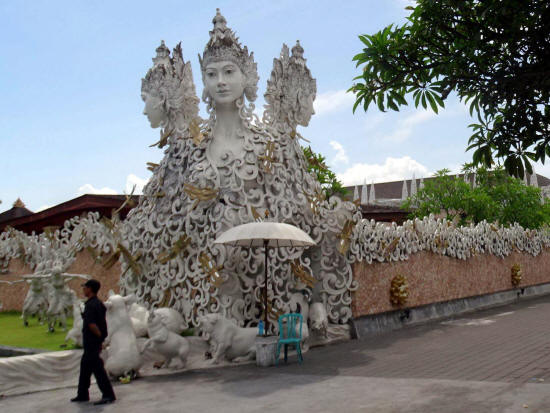
Intricate statues usually signify entering a new town or city.
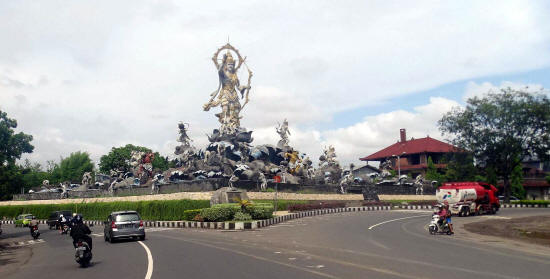
These enormous, elaborate statues and fountains
are at a crossroad leading to Denpasar, the busy
island’s capitol.
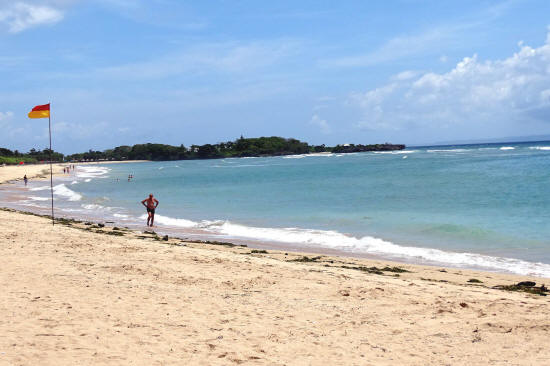
Southern beaches.
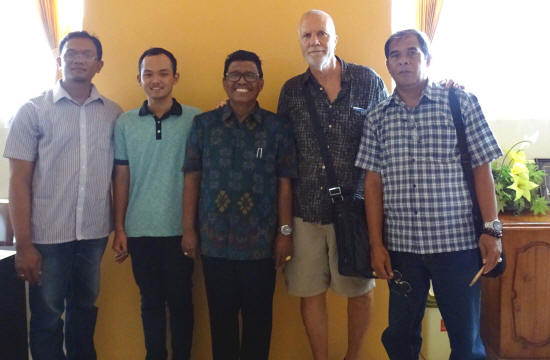
Joseph meeting with neighbor Abu and faculty from the oldest University in Bali.
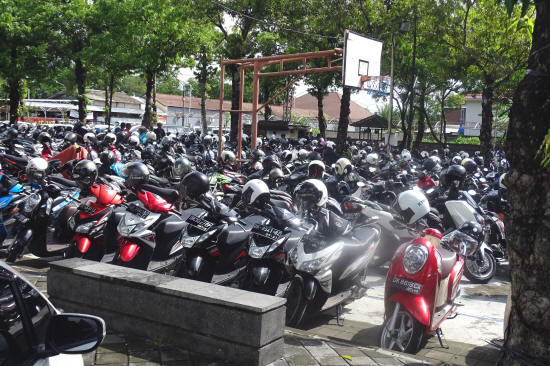
No doubt how people get around in Bali.

We attended an interesting talk by Graham Hancock about 20,000 year old pyramids in Indonesia.

Everywhere you go buildings are artistically decorated.
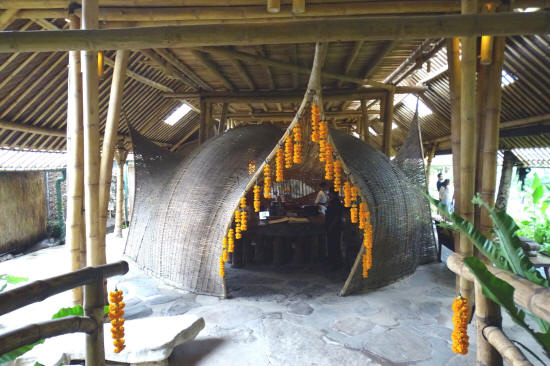
This cafe is connected to the Green School and made entirely from bamboo and natural materials..
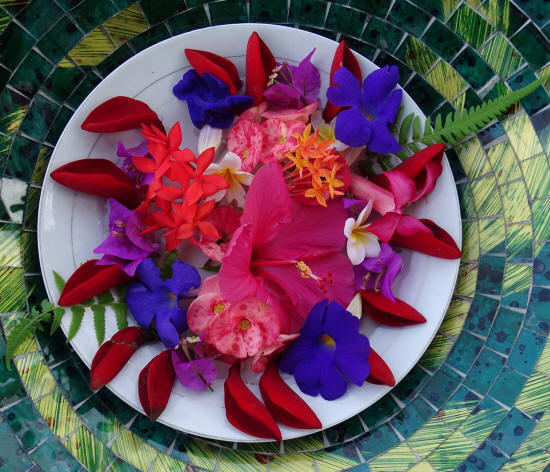
Bali is like walking into a beautiful painting. (A flower offering I made for our home.)

Many restaurants grow their own organic vegetables around Ubud.
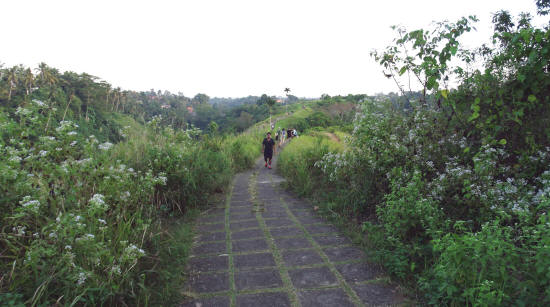
A hike not to be missed, Champuan Ridge.

There be fairies and elves along the way!
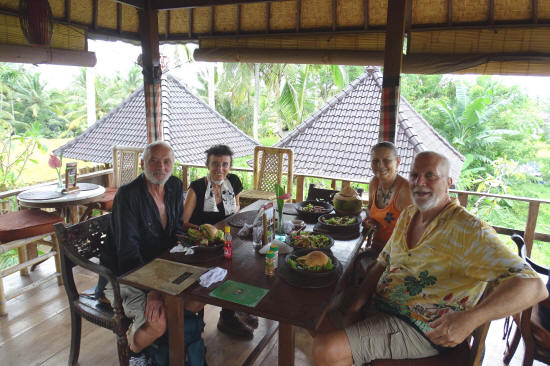
We hiked out to Sari Organics Farm and Cafe in
the rice fields, with friends from Quebec.
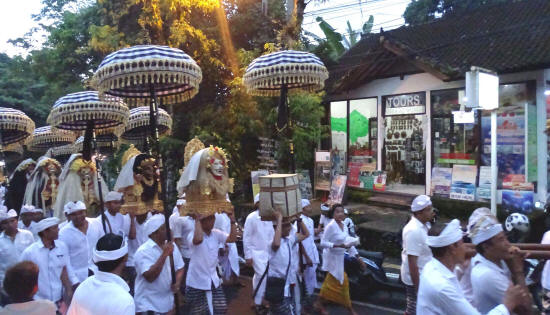
A ceremony honoring the villages temple.
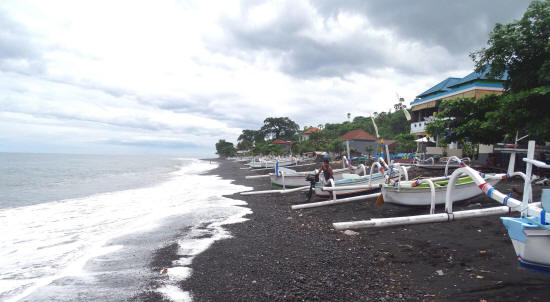
Amed, in Eastern Bali.

Mt Agung peeking out from behind the clouds.
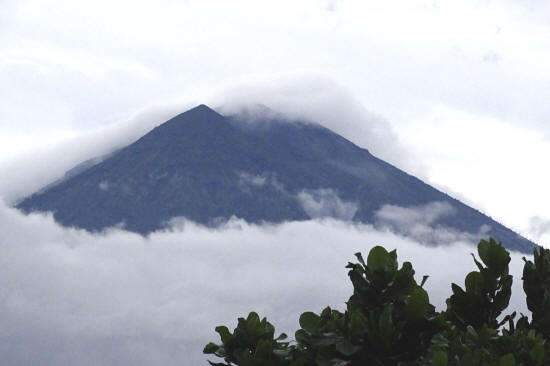
Mt. Agung volcano still erupts
every 20 years or so.
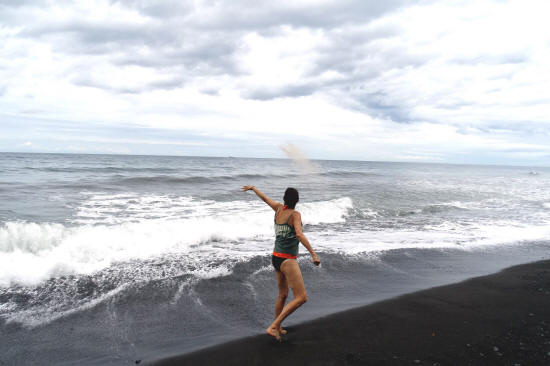
Scattering my Mom’s ashes to the ocean.
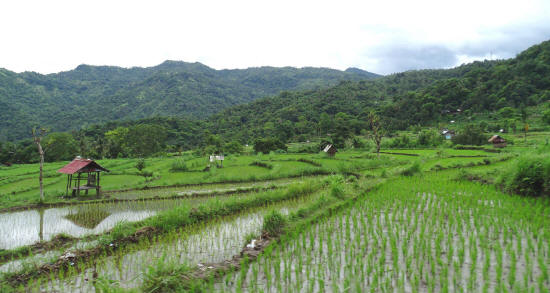
Beautiful rice fields on the way back to Ubud,
through the mountain village of Sideman.
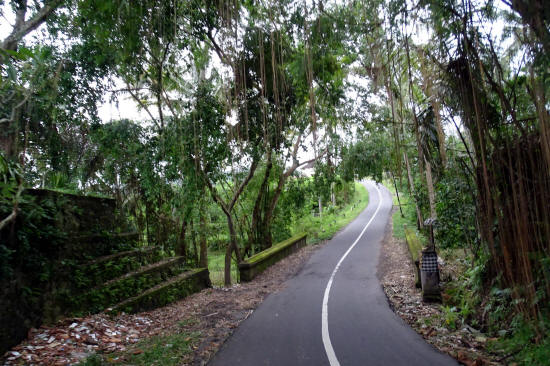
Quiet country lanes, vs. the congested south
island traffic. In Bali you just need to
know where to go to get away.
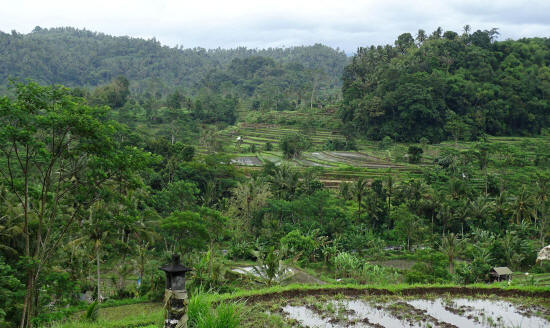
Many stunning rice terraces.
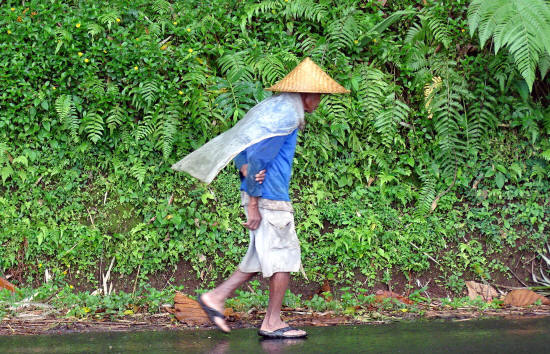
Balinese superman knows how to stay dry
during the rainy season.

Easy to figure Bahasa Indonesian –
‘duffry shops’ – ‘Taksi’, etc.

